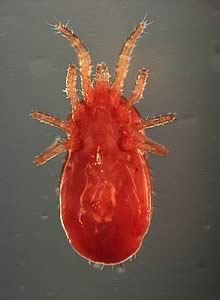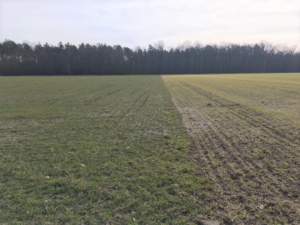 Poultry producers are facing a particularly high risk of red mite infestation this spring, with warm weather and the need to house birds causing outbreaks across the country.
Poultry producers are facing a particularly high risk of red mite infestation this spring, with warm weather and the need to house birds causing outbreaks across the country.
“The worry of avian influenza is at the forefront of everyone’s mind right now – but with free-range birds having to be housed as a result, the reality is that red mite populations are exploding,” explains Alison Colville-Hyde, field services manager at St David’s Poultry Team. “Red mite can be debilitating to hens and irritating to egg collectors, as well as causing economic loss through egg downgrades and increasing the risk of disease transfer.”
The forced housing of birds due to avian influenza, combined with the warm weather, favours the red mite’s life cycle, adds Ms Colville-Hyde. “Fortunately, we now have a new product with which to treat red mite in one quick, easy, and safe way.”
Dergall is an innovative new red mite treatment which has been six years in the making. A non-toxic product, it works by mechanical means rather than systemically, so unlike many insecticides it is safe to poultry and humans, and does not cause resistance in the red mite population.
“When mixed with water and sprayed onto the inside of the poultry house, Dergall creates a unique three-dimensional molecular structure which is air permeable,” explains Ms Colville-Hyde. “This structure immobilises the mites and blocks their spiracles, through which they breathe. This action results in destruction of the mite eggs, nymphs and adult red mites.”
Used at 1%, one litre of Dergall dilutes into 100 litres of solution to spray – and can even be safely sprayed directly onto the birds. “One treatment is usually sufficient to knock back the mite population to practically zero,” she adds. “If you need to treat again subsequent treatments at half the concentration can be made.”
Red mites feed on birds at night, under the cover of darkness, by sucking their blood. Once they have fed the mites crawl back out of sight into hard-to-reach places of the poultry house, often never seen until the infestation is out of control.
“Mite infestations can cause huge stress on the birds: Initially you may not realise the mites are present, but as their population develops the hens become agitated, often hardly resting during the night, which is an important time for them to relax and recharge ready for the next day’s feeding and egg laying,” explains Ms Colville-Hyde.
“Red mites can carry disease from one flock to the next and in heavy infestations they suck so much blood from the bird they can cause anaemia and eventually death. Egg production can dip and red streaks on the eggs, caused by the mites, may be seen too.”
Dergall is being distributed by St David’s Poultry Team; a poultry only veterinary practice covering the whole of the UK and Ireland. For more information please visit www.stdavids-poultryteam.co.uk or call Alison Colville-Hyde on 077697 10855.



